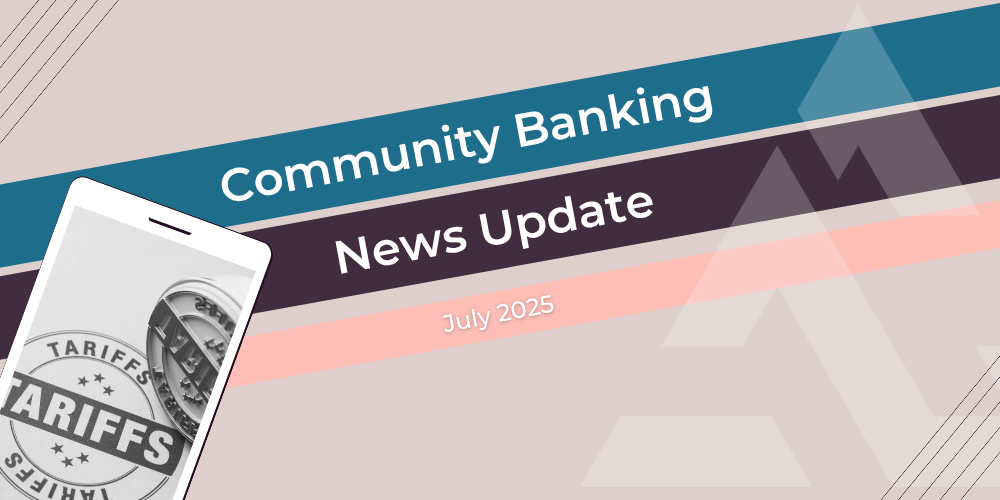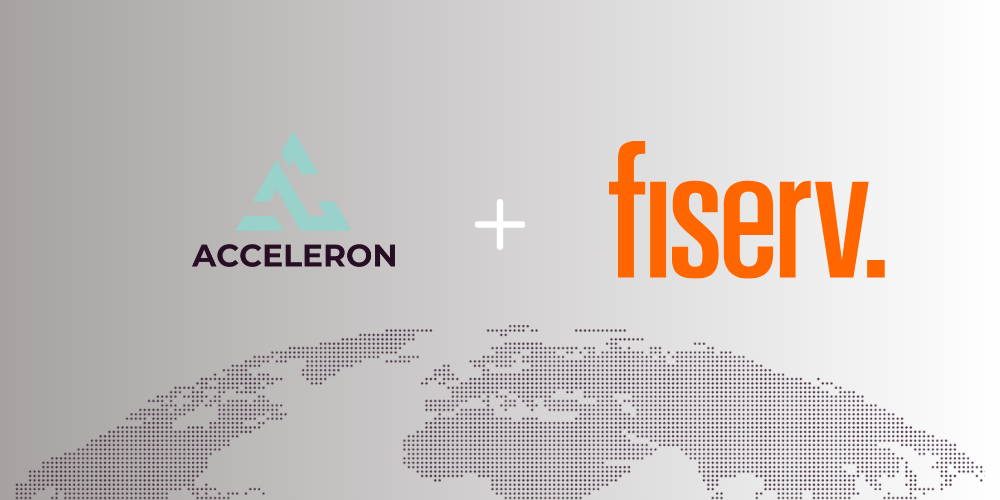This month’s biggest stories in community banking and their impacts on your financial institution.
Welcome to this month’s Community Banking News update, your go-to roundup of the biggest news developments affecting community banks and credit unions, plus why they matter. Last month, we covered Michelle Bowman’s confirmation as the central bank’s top regulator, the CFPB’s reversal on Open Banking, bank M&A’s and more. (Missed it? Catch up here.)
This month, we lead with big headlines, with a new head of the OCC confirmed, the Trump administration announces 25% tariffs on Japan and South Korea, the “Big Beautiful Bill” is signed into law, expedited bank merger reviews are reinstated, crypto firms apply for bank charters, Fiserv launches a stablecoin, and banks team up with tech companies to introduce new AI governance standards for banks. How will these developments affect community FIs? Read on to find out.
1. Jonathan Gould Confirmed as OCC Comptroller, Backed by Crypto Experience
The U.S. Senate confirmed Jonathan Gould, former senior Office of the Comptroller of the Currency (OCC) official and ex-chief legal officer at blockchain company Bitfury, as the next Comptroller of the Currency. Gould returns to the OCC after serving under Acting Comptroller Brian Brooks, a former OCC head-turned-crypto executive. Brooks had led early efforts to open chartering paths for crypto firms, but the agency later shifted to a more cautious stance under the Biden administration. Gould’s confirmation signals a renewed Trump-supported push to ease regulatory barriers for digital asset activities within
Why this matters to community banks and credit unions:
Gould brings deep regulatory expertise and strong ties to blockchain firms, indicating the OCC may pivot toward a more innovation-friendly posture, particularly around digital assets, stablecoins, and bank charters. For community institutions, this shift could unlock novel opportunities, but also carry new risks. Community banks and credit unions should engage closely with upcoming OCC guidance, assess how crypto-related services fit within their risk frameworks, and explore strategic collaborations, all while ensuring they remain compliant in a landscape where policy could change swiftly under new leadership.
2. Trump Administration Announces 25% Tariffs on Japanese & South Korean Goods
President Donald Trump has announced a 25% tariff on a wide range of imports from Japan and South Korea, via letters posted on Truth Social to the leaders of both countries. The tariffs will take effect August 1, 2025, and are being justified as measures to correct what the administration views as “unfair trade balances.” The U.S. is also poised to impose similar tariffs on 12 other nations, ranging from 25% to 40% on countries like Indonesia, South Africa, Serbia, and Malaysia.
Affected countries and U.S. importers warn of potential delays and retaliatory trade measures. The move comes as businesses are already grappling with inflationary pressures and global supply chain shifts.
Why this matters to community banks and credit unions:
Community financial institutions can play a crucial role in helping small and mid-sized businesses navigate the fallout from tariffs. Rising costs and longer payment cycles may create cash flow gaps for importers, manufacturers, and suppliers. Now may be a good time to offer strategic working capital solutions such as hedging, supply chain finance and more to help clients stay liquid and competitive.
Acceleron CEO Damon Magnuski recently participated in a webinar with Ionfi on how banks can support clients through tariff uncertainty. Watch it here:
3. “Big Beautiful Bill” Signed Into Law, Slashes CFPB Funding
President Donald Trump has officially signed the sweeping Big Beautiful Bill into law after it passed both chambers of Congress in late June. The megabill combines tax cuts, entitlement reforms, and increased funding for border security and defense. The American Bankers Association has voiced its support for the bill, highlighting the tax relief it offers to businesses and individuals. Critics, however, argue the bill increases the debt load and undermines key regulatory safeguards.
Among its most consequential provisions for the banking sector is a dramatic cut to the Consumer Financial Protection Bureau’s (CFPB) funding. The law reduces the CFPB’s budget cap from 12% to 6.5% of the Federal Reserve’s annual earnings, a change expected to push the agency to rely on congressional appropriations for future funding.
Why this matters to community banks and credit unions:
With the CFPB’s independent funding curtailed, enforcement activity may slow, especially around mortgage lending, consumer disclosures, and small-dollar credit. While this could ease some regulatory burdens in the short term, it also increases uncertainty. Community banks and credit unions need not interpret this as a signal to lower compliance standards. In fact, maintaining strong internal controls and proactively helping customers navigate consumer protection issues can help institutions differentiate themselves as responsible, transparent partners.
4. Trump Signs Law Reinstating Expedited Bank Merger Reviews
President Donald Trump has signed legislation officially repealing the September 2024 OCC rule that had eliminated the “expedited review” process for certain bank mergers. The law was passed by both chambers of Congress under the Congressional Review Act (CRA) and restores the prior framework, in which uncomplicated mergers could receive fast-track approval if regulators did not object within 15 days of the public comment period. This reversal aligns with industry calls to streamline merger approvals and reduce regulatory bottlenecks.
Why this matters to community banks and credit unions:
The return of expedited reviews gives community financial institutions a clearer, faster path to pursue strategic mergers and acquisitions. For smaller banks and credit unions seeking scale, market entry, or operational efficiencies, the restored framework reduces uncertainty and administrative overhead. This regulatory clarity could be especially impactful for institutions in rural or low-growth areas looking to combine resources or expand service footprints.
5. Crypto Firms Apply for Bank Charters as Stablecoin Regulation Advances
Stablecoin issuer Circle Internet Group has formally applied to the OCC for a national trust bank charter. This move will put Circle under federal regulatory oversight and strengthen the infrastructure of its flagship USDC stablecoin. The planned institution, named First National Digital Currency Bank, would oversee USDC reserves and offer institutional digital-asset custody without accepting traditional deposits or issuing loans.
Ripple Labs has also announced that it applied for a national bank charter and a Federal Reserve master account, enabling it to hold its RLUSD stablecoin reserves directly with the Fed. Both moves come against the backdrop of Senate passage of the GENIUS Act. If passed by the House, the law would formalize U.S. stablecoin frameworks for the first time.
Why this matters to community banks and credit unions
The Senate’s passage of the GENIUS Act, along with high-profile bank charter applications from Circle and Ripple, marks a significant shift: digital asset firms are actively seeking integration into the regulated financial system. While a comprehensive regulatory framework for stablecoins is still taking shape, this raises strategic questions. Now is the time to monitor emerging rules closely, assess potential risks, and explore where partnerships or competitive positioning may be necessary, especially as customer expectations around speed, transparency, and digital innovation continue to evolve.
To read more about how community banks might interact with stablecoins, read our interview with Ethan Singleton, Managing Principal at FS Vector, an advisory firm:
6. Fiserv Launches FIUSD Stablecoin for Community Banks
Meanwhile, Fiserv announced its foray into stablecoin technology by issuing its own new stablecoin. FIUSD, a U.S.-dollar–pegged digital asset designed specifically for financial institutions, will integrate into Fiserv’s current banking and payment infrastructure, used by approximately 10,000 banks and credit unions and 6 million merchants, at no additional cost to clients. Leveraging blockchain infrastructure from Paxos, Circle, and the Solana network, FIUSD aims to offer a secure, scalable, and interoperable solution by year-end. Fiserv is also partnering with PayPal to enable seamless transfers between FIUSD and PYUSD and working with Mastercard to support stablecoin-linked debit cards, opening possibilities for instant domestic and cross-border payments.
Why this matters to community banks and credit unions
Fiserv’s launch of a stablecoin tailored for financial institutions signals growing interest in blockchain-based payment infrastructure from major established providers. While the regulatory landscape for stablecoins is still developing, FIUSD introduces a potential new tool for enabling digital payments within Fiserv’s ecosystem. For community banks and credit unions, this development warrants close observation. Institutions should assess how digital assets like FIUSD might impact deposit flows and customer expectations, especially if interoperability expands. As the market evolves, staying informed and evaluating the operational, compliance, and strategic implications of stablecoin adoption will be critical to maintaining competitiveness in the long term. In the meantime, wires remain the safest method of sending high-value cross-border payments.
Read about Acceleron’s partnership with Fiserv to automate wire processes for community FIs:
7. Banks, Big Tech Team Up on Open-Source AI Governance Standards
Leading global banks, including Citi, Morgan Stanley, Royal Bank of Canada, and BMO, have joined forces with major cloud providers (AWS, Google Cloud, Microsoft) and other technology firms to develop standardized, open-source governance controls for AI in financial services. Spearheaded by the Fintech Open Source Foundation (FINOS), the initiative aims to build upon earlier efforts around secure cloud practices to create a robust real-time compliance validation toolkit for AI adoption in banking.
With regulators only beginning to establish clear AI frameworks, having a vendor-neutral, industry-developed standard can help ensure safety, fairness, and accountability, critical as banks increasingly adopt AI across credit, risk, fraud detection, and customer service.
Why this matters to community banks and credit unions
By participating in or adopting FINOS-developed AI governance standards, community banks and credit unions gain several advantages. The shared toolkit can offer a clear, low-cost blueprint for responsible AI usage, reducing the risk of biased algorithms, data misuse, and compliance violations. Standardized protocols can also ease vendor due diligence and integration challenges, allowing smaller institutions to more confidently adopt cloud-based AI solutions without complex, in-house policy development.
Acceleron is a modern correspondent banking platform that empowers community banks and credit unions to automate international wire transfers, capture non-interest income, and compete more effectively with big banks. With a foreign exchange (FX) marketplace and currency conversion engine, Acceleron’s API-first infrastructure helps institutions turn cross-border payment flows into efficient, revenue-generating opportunities. Serving over 200 financial institutions and facilitating more than $1 billion in international payments annually, our correspondent banking services and international payment automation solutions are pre-integrated seamlessly with Fiserv Payments Exchange, Braid, and other leading payments platforms.
Subscribe to our monthly newsletter, "The Exchange," to stay ahead of the curve and get monthly news updates, original content and insights you won't find anywhere else!
 Daisy Lin, Head of Marketing, Acceleron
Daisy Lin, Head of Marketing, Acceleron






